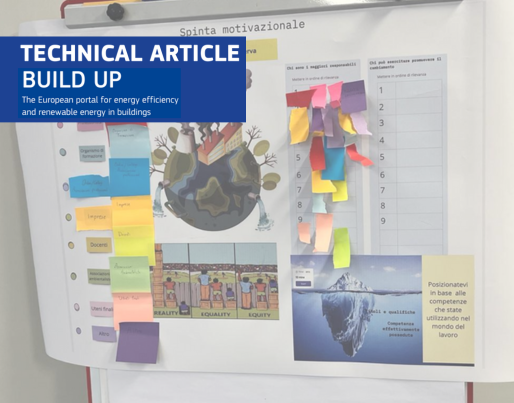Developing the Italian Roadmap toward the skills needed for a Sustainable Built Environment

Developing the Italian Roadmap toward the skills needed for a Sustainable Built Environment
Authors
Alexandre Patouillard, in house consultant IBIMI - LinkedIn profile
Anna Moreno, International affairs and sustainability IBIMI - LinkedIn profile
(Note: opinions in the articles are of the authors only and do not necessarily reflect the opinion of the EU).
Introduction
In Italy, public works are (and will continue to be for at least the next ten years) protagonists of the construction market. This is because of the PNRR (National Recovery and Resilience Plan), previous legislation, and the resources allocated to it.
Analysing market trends at current values of the number of tenders and awards for the construction of public works shows that Italian investment has grown by around 10% annually since 2017 until it declined by 4.7% in 2020, and then grew again, at deflated values, by up to 21.4% in 2021 [1].
Such demand, both public and private, is challenging because construction market growth is not supported by growth in the size of companies [2]:
60% have a single employee.
3.7% have 10-49 employees.
0.3% have 50 employees or more.
Out of the total number of workers only 6.5% are women and 17.2% are immigrants [3].
The analysis of construction companies by turnover class shows the sector is mainly characterised by production companies with reduced business volumes (<500.000€).
PNRR investments brought a dramatic increment of employment (ISTAT) contingent on skills needed for decarbonisation, RES, and energy performance. A shortage of professionals in these skills has been observed (the energy gap) but being most SMEs are self-employed persons and they do not feel a need to be qualified as the shortage means they find work anyway.
The RES2 Project (REsilient System for the Recognition of Energy Skills) intends to contribute to finding solutions to the current skills gap. This article intends to focus on the early results of the project’s Workshops plan, and in particular of the Building 4.0 workshop held in the Rome Innovation Centre.
About the project: goals and approach
RES2 was created to contribute to Italy reaching the 2030 objectives for energy efficiency in buildings. The first requirement that was immediately clear was for a workforce equipped with the necessary digital and green skills.
In Italy today many of these competences are still lacking, both among design professionals and construction and installation and building maintenance companies.
The RES2 Project, funded by the EU LIFE Programme, intends to support decision makers, companies, and professionals in the industry, as well as VET (Vocational Education and Training) providers, in taking the necessary steps to develop and formally recognise the digital and green skills most required by the market.
To that end, RES2 is drafting a comprehensive analysis of the state-of-the-art building sector training systems, of the need of renovation of the Italian building stock and also the needs for workforce upskilling. As part of this process, the project is discussing these matters with key stakeholders at both local and national levels to identify potential social, technological, political, and legal barriers and solutions to address the skill gap and other key issues hampering further development of the Italian building sector along the 2030 agenda directives.
The goal of these discussions is to discover shared and sustainable solutions in the short, middle, and long term, and drafting a roadmap to reach the 2030 Agenda objectives based on the results of the desk analysis and stakeholder inputs.
Throughout all its activities, RES2 promotes an innovative approach stemming from market demands, to gain concrete results starting from the short term:
Micro Competences: starting from the identification of strategic micro-competences, these are analysed and placed within the work process, defining the appropriate EQF level.
Flexible Approach: where the market demands continuously change, the key to success is flexibility.
Shared development: via workshops and living labs the project involves all key stakeholders in the sector and analyses the best practices at EU level, as well as their applicability to the Italian context and the barriers and solutions to consider for successful adaptation and adoption.
Connection to the national contracts: thanks to our partner CNCE, the project intends to propose the inclusion of the new professional profiles within national contract laws, in order to achieve formal and economic recognition of the new professional figures.
The workshops
RES2 designs its workshops to form a path of progressive development of new solutions, ideas, and innovations, each building from the results produced by the preceding workshops. The participants are chosen from all stakeholder groups at the local and national level, to include as many perspectives, levels of expertise and lived experience as required to construct a full and shared understanding of complex Italian realities in the field.
Figure1. Experts at work to depict the realities of the Italian construction market.
RES2 experts start with a general analysis of the existing literature, particularly at the European level, to develop a starting framework, formulate a batch of questions, and identify potential issues and possible avenues for solutions and proposals.
This initial toolkit is integrated during the workshops with the know-how, experience, and perspectives of the participants using dynamic work groups, with the aim of producing an updated kit and gradually developing both a global roadmap and local guidelines. One of the themes of the following workshops is the qualification of historical buildings, which represents 25% of all Italian units.
Results of the first workshop: identifying the issues
During the Rome workshop, a detailed picture of the critical issues plaguing the Italian building sector emerged. Analysing the produced material, a first basic iteration of an updated critical framework was developed.
Figure 2. A representation of the weaknesses of the current Italian system
The main centre of concern appears to be the current general policy of Cost Minimisation: the politics of incentivising procedures, practices, and projects (both in the ordinary and in innovation and research) designed to go below budget as much as possible in order to produce savings, with less focus on the effective quality and the scope of the impact.
This focus on accumulating savings above investing in maintaining and improving functionality appears to contribute to several connected issues negatively and massively, including a growing skill gap in the domain of green and digital transitions.
A tendency has been currently emerging to move away from this general policy and toward the criteria of ‘best technical solution’. However, if not matched by effective means of verifying workforce competence, and by also tackling other issues such as those presented here, this shift could bring about an increase in funding spent while keeping the same level of poor performance.
Product Quality Reduction
The lack of focus on functionality and effective impact contributes to the development of policies and practices that forego quality control and accountability in favour of budget constraints and accounting.
This incentivises immediate financial savings and short lived, one-off ad hoc interventions (emergency ‘patches’), while defunding or delaying most acts, initiatives, and practices with a broader temporal and/or impact scope, including training and maintenance, thus reducing the overall quality of production and services, as well as increasing environmental impact, increasing skill gaps, and decreasing sustainability.
Cooperation Reduction
The drive towards short-term and punctual initiatives inherent to cost minimisation appears to incentivise purely nominal cooperation, as developing shared practices and synergies is most often classified as an additional cost aimed at mid-to-long-term development, therefore, as a short-term inefficiency to be cut.
This tendency appears to impact both territorial cooperation among private entities and institutional cooperation among and with public entities. This appears to: a) further reduce the possibility of end users to be involved in the building process at key stages, further reducing effective quality and contributing to serious social issues; and b) reduce the possibility of businesses and various field actors to directly and effectively communicate needed skills and updates to training and education institutions and enterprises, thus increasing skill gaps in the Italian market.
Figure 3. The start of the workshop: identify the main culprits of climate change.
Ineffective Training/Education
A direct consequence of cost minimisation is the push to justify uncut expenses in a defensive manner, to protect them from further defunding. This, in tandem with the short-term punctual focus, incentivises a priority allocation of funds toward obtaining punctual exceptional results rather than building and maintaining a general level of quality.
At a training and academic level, this appears to have contributed to a policy of cultivating the excellence of the top students and developing extensive theoretical curricula, in order to present an impressive appearance of quality; this however appears to come at the expense of updating training practices and maintaining the general level of student qualifications, particularly in practical and relational fields.
This can be gleaned from the following graph (Figure 4), showing the first results of RES2 questionnaires. Job-oriented subjects are seldom taught, and the overall skill level remains mediocre.
Figure 4. Early results of one of seven questionnaires set up for the analysis of the current status quo.
The reported results are incompetent employees, hyper-competitive and hostile learning environments, incomplete and outdated curricula, and significant skill gaps in key areas, notably in regard to green and digital transitions.
Retrograde Building Sector
The reported reality of this sector in the internal Italian market is in a state of exasperated difficulty due to the combination of the previously described issues. Cost minimisation incentivises building businesses, ventures, and projects to stick to what they know, delaying effective large-scale innovation as too expensive in favour of merely nominal pilots. Furthermore, maintaining territorial functionality and social stability while cutting costs (particularly of maintenance) is often impossible in practice, incentivising local actors to invest off the books in informal, submerged economies built upon underpaid and untaxed labour, as well as clientele pacts between interested parties (including PA actors).
This inertia to change, in tandem with an increasing skill gap in key areas, keeps outdated high-environmental-impact practices and technologies going, while the lack of maintenance further exacerbates pollution and territorial degradation, both biologically and socio-culturally.
The lack of effective territorial cooperation and training and education, and the consequent reduction in quality of production and service, further damages the sector's reputation and attractiveness, in return reducing the number of students and aspiring labour, at the risk of falling into a death spiral.
The deteriorating working conditions have a disproportionate impact on the most marginalised, who are more easily forced into informal unprotected labour, and the general hostile trend of the sector is a severe obstacle toward including people who were traditionally excluded from its workforce, as well as toward integrating the new skills and perspectives needed that would combat the current skills gap.
The reported result of these interconnected issues is a severe reduction of investments and competitivity within the internal Italian building sector, that is at risk of not only lagging in the European efforts towards the 2030 Agenda objectives, but also of not developing the structures and skills needed to turn this negative trend around.
Results of the first workshop: proposing solutions
Despite the complexity of the challenges facing the Italian building sector in adapting to future needs and promoting sustainability, several perspectives and opportunities for effectively addressing these challenges emerged during the workshop.
The experts engaged in constructive discussions to identify innovative and viable solutions. The diversity of the stakeholders involved in the workshop favoured the adoption of a core framework based on cooperation, iterative processing, effective large-scale and long-term impacts, and guaranteeing accountability to maintain future adaptability.
Figure 5. The representation of the strength of a system based on the highest impact.
The main core of the proposal is a paradigm shift of general policy from minimising cost to Maximising Impact, incentivising practices, acts, and projects spending all the available budget as effectively and constructively as possible, thus producing change, new better adapted structures and skills, as well as investment opportunities and returns, rather than savings and a mere continuation of outdated notions and established balances of power. Such a shift might reportedly entail:
Adopting current and new cooperative models
Italian laws and policies already define and regulate dynamic forms of territorial cooperation between both private and public parties with the aim of creating participatory and iterative processes of development at the local and national scale. However, for those to be effectively applicable and have meaningful impact, they must be considered as key investment areas within a mid-to-long term perspective framework that needs to become part of the general policies of local and national PA actors.
Therefore, cooperation needs to receive significant investment and priority consideration as new basic skills and operating procedures within PAs and private actors. With such focus, it would be possible to involve representation of end users and other key stakeholders at all stages of construction, starting from ideation and design, greatly increasing quality control, transparent accountability, and investment opportunities.
Reforming training and education
A focus on effective, large-scale impact and long-term cooperation between diverse societal actors requires a significant shift in current training and education curricula and methodology. Reported market and field needs and failure points revolve around two broad skill gaps: practical application of up-to-date technical competences, and relational maturity in a workplace environment.
It appears that teaching and training methodologies should focus more, as research often already proposed during the 20th century, on practical competences, field group work in cooperation with local actors, integration and validation of lived experiences (bringing to effective practice what was already adopted in Italian law with the DLgs 16/01/2013 n°13), and priority discussion and adoption of new technologies, practices and strategies.
This model would not only allow for better job-oriented training but also integrate the necessary focus on the life skills and active citizenship competences part of the 2030 Agenda. Thus, students and trainees would on average be both more qualified and more employable within a cooperative work environment, contributing to reducing the skill gap in respect to the goals of the green and digital transitions.
Establish participatory and circular economy models
With a more qualified workforce, applied and effective cooperation policies in place, and consistent result-oriented investments and grants available, it would be possible to build new local and/or national models based on participatory and/or circular economy principles, with the aim of increasing sustainability and effective democratisation of building and maintenance processes, as well as creating investment pools less affected by market volatility.
To further support these models and the diffused competency and citizen engagement they require, the proposal would be to greatly invest in forms of welfare toward students and trainees of all ages: higher retributions, lower taxes, childcare facilities availability, co-housing and residency facilities and programs, extension of workers’ protections to new types of employment.
Transition toward Building 4.0
The proposed changes could greatly increase the workplace attractiveness of the building sector in Italy while providing the tools, skills and investments required to update it in line with the green and digital transition. A greater capacity for institutional cooperation would allow the sector to directly interface with academia and PAs to better define and validate needed professional roles, qualifications and skillsets through diversified curricula, including micro-courses and field experience validation.
The result-oriented and cooperative-minded focus inherent to a maximising impact general policy grants a broader scope of investment while inherently imposing greater accountability, particularly through the direct involvement of key stakeholders at all stages. This discourages clientelism and informal labour exploitation, while increasing overall quality and allowing space for more marginalised and/or previously excluded groups to be included from the start, increasing the scope (and therefore quality) of the potential workforce.
This newfound potential for inclusivity could be further enhanced via participatory and circular economy models and the use of new technologies as labour areas less encumbered by traditional prejudices and habits.
The predicted potential outcome for the implementation of such proposals is the possibility of an effective, gradual transition toward a building sector based on inclusivity, cooperation, and long-term impact, eventually becoming able to develop and implement the skills, tools, and structures (political, economic, technical, socio-cultural) needed to reach the goals of the 2030 Agenda in regard to the green and digital transition, thus increasing overall competitivity.
Conclusions
RES2 initial results show significant active participation from involved stakeholders and proactive material being produced. Issues at all levels have been identified and discussed and large-scale impact solutions proposed to provide appropriate tools, opportunities, and political direction: increasing cooperation, long-term investment, inclusivity, and accountability to establish a dynamic innovation process could create the needed conditions to reduce skill gaps currently sabotaging significant change.
RES2 doesn’t expect all the green and digital transitions goals to be met by 2030 but is confident that solutions and processes to reach them could be developed and integrated by all stakeholders within that timeframe.
References
[1] Data from CRESME Europa Servizi
[2] Following data is from ISTAT (Istituto Nazionale di Statistica)
[3] Data from 2017 (ISTAT)


